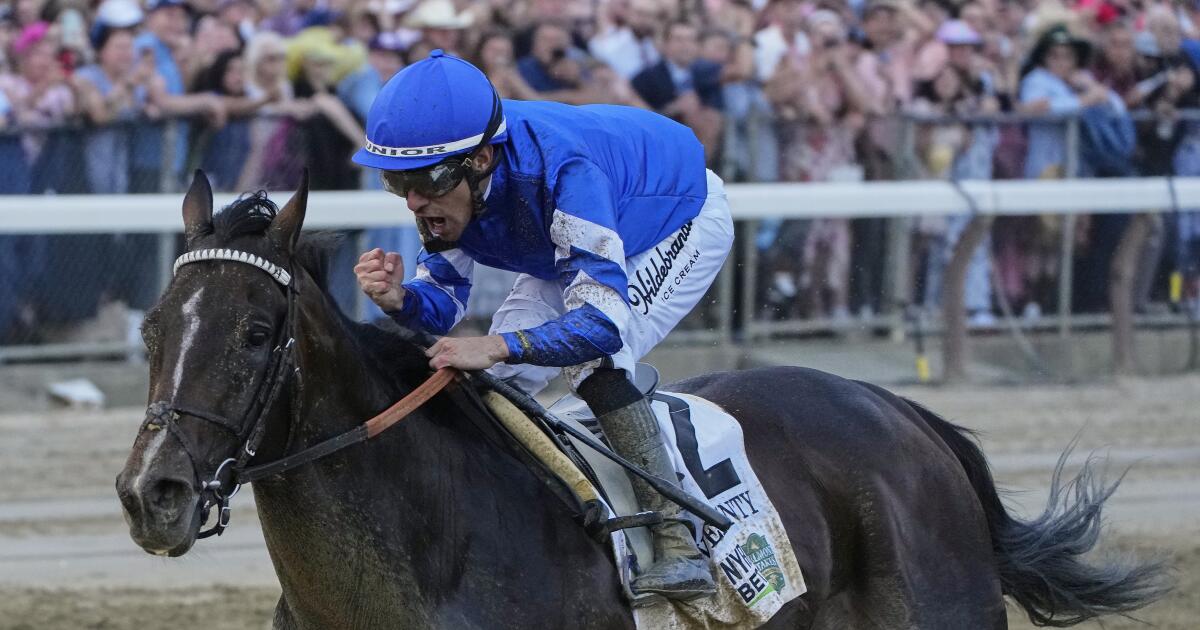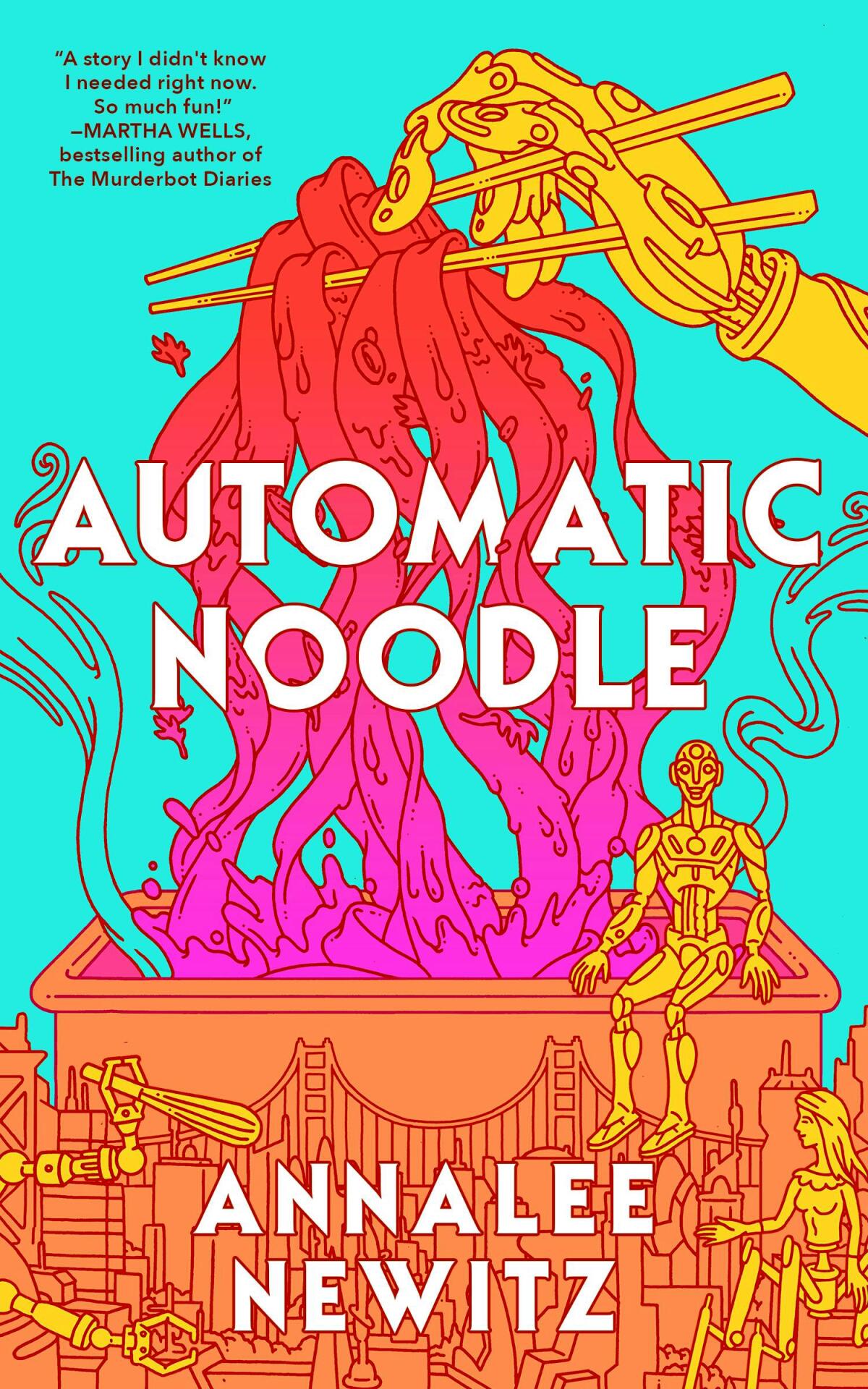Reading List
10 books for your August reading list
If you buy books linked on our site, The Times may earn a commission from Bookshop.org, whose fees support independent bookstores.
Contrary to some recent media chatter, the novel isn’t dead: A glance at this month’s choices, which include quirky robot sci-fi, an artist’s tale set in 1950s Mexico and a dysfunctional family’s reckoning with addiction, proves that imaginative storytelling has a strong heartbeat. Meanwhile, whether you’re looking for history or current events, check out an oral history of the atomic bomb, an expert’s thoughts on climate change and a thorough tribute to the writer James Baldwin. Happy reading!
FICTION
Automatic Noodle: A Novel
By Annalee Newitz
Tordotcom: 176 pages, $25
(Aug. 5)
Late 21st-century San Francisco: California has seceded from the United States, and robots serve humans like crypto money launderer Fritz Co, whose Burgers N More is a front. He absconds and leaves four robots adrift, but with aid from unhoused human “robles,” they reconfigure the joint as a ramen shop — until robophobes launch a campaign to shut them down. Robots Staybehind, Sweetie, Cayenne and Hands will capture readers’ hearts.
People Like Us: A Novel
By Jason Mott
Dutton: 288 pages, $30
(Aug. 5)
Soot, one of the protagonists of Mott’s funny and affecting new book, also appeared in 2021’s “Hell of a Book.” Like the (at first) unnamed narrator, Soot is now a middle-aged writer from North Carolina (Mott originally intended this story to be in memoir form), and both men’s paths illustrate the difficulty of reconciling being Black with being American. While the theme of gun violence plays an important role, Mott is ultimately concerned with how and where his characters find safety.
Fonseca: A Novel
By Jessica Francis Kane
Penguin Press: 272 pages, $28
(Aug. 12)
In this fictionalized version of British novelist Penelope Fitzgerald’s real-life trip to Saltillo, Mexico, in 1952, she arrives pregnant with her son Valpy in tow, hoping eccentric, elderly sisters might keep their promise to leave Valpy their silver mine. “Fonseca” (“dry well” in Latin) is how Fitzgerald always referred to Saltillo, but Kane’s remarkable excavation of this interlude, including real letters from Valpy, drips with juicy conflict and detail.
The Frequency of Living Things: A Novel
By Nick Fuller Googins
Atria: 336 pages, $29
(Aug. 12)
Three sisters make up the band name “Jojo and the Twins” — but Jojo, younger sister to identical twins Emma and Araminta (Ara), isn’t in the band. Instead, she’s the caretaker for her siblings, who made a fortune with their blockbuster hit “American Mosh,” then lost that fortune, in part due to Ara’s substance addictions. Chapters alternate between Jojo, Emma, Ara and their absentee mother Bertie, who all discover that big love has big costs.
Katabasis: A Novel
By R. F. Kuang
Harper Voyager: 560 pages, $32
(Aug. 26)
Alice Law and Peter Murdoch, Cambridge University doctoral fellows in Magick, wind up in Hell looking for their adviser in a dark academia thriller whose title is the Greek word for “downward journey.” This version of Hell closely resembles Dante’s “Inferno,” with many circles leading toward the very worst human actions. There’s a great deal of doubling back and a lot of incantatory action, both of which sci-fi/fantasy stans will appreciate.
NONFICTION
The Devil Reached Toward the Sky: An Oral History of the Making and Unleashing of the Atomic Bomb
By Garrett M. Graff
Avid Reader Press: 608 pages, $35
(Aug. 5)
Many accounts of the unusual and unholy circumstances that led to the atomic bombs dropped on Japan at the end of World War II center on scientific discovery, neglecting the enormous human and environmental toll involved. Not so with journalist Graff’s (“When the Sea Came Alive”) approach, in which everyone from theoreticians to site managers on to survivors of all ages share first-person stories of what they did, saw and understood.
Putting Myself Together: Writing 1974–
By Jamaica Kincaid
Farrar, Straus and Giroux: 336 pages, $30
(Aug. 5)
Since her 1985 debut novel, “Annie John,” the Antiguan-born Kincaid has been impossible to ignore, and this collection of essays and journalism shows why: Even as some critics have found her prose too personal or political, Kincaid knows she meant it to be so. Ranging from her famed “Biography of a Dress” to pieces for the New Yorker on to essays on gardening, the works speak of a person who has refused to be defined by any kind of constraints.
Greyhound: A Memoir
By Joanna Pocock
Soft Skull: 400 pages, $19
(Aug. 12)
The Great American Road Trip, that idealized trek heading west, might be different now, according to author Pocock, who first made that journey in 2006 from Detroit to Los Angeles in the wake of grief after several miscarriages. In 2023, retracing her steps via Greyhound bus like French writer Simone de Beauvoir (“America Day by Day,” 1948), she discovers fewer humans, more dirt and less safety — but the same magical “sense of no longer existing.”
Baldwin: A Love Story
By Nicholas Boggs
Farrar, Straus and Giroux: 720 pages, $36
(Aug. 19)
James Baldwin’s four great affairs (intellectual, romantic, platonic and artistic) provide a beautiful structure for this biography, which includes careful research into the writer/activist’s upbringing and political formation as well as his widespread influence. Beauford Delaney’s creative guidance, Lucien Happersberger’s intimacy, Engin Cezzar’s call to activism and French painter Yoran Cazac’s artistic collaboration — each forms a polished facet of Baldwin’s gem-like dazzle.
Here Comes the Sun: A Last Chance for the Climate and a Fresh Chance for Civilization
By Bill McKibben
W. W. Norton: 224 pages, $30
(Aug. 19)
Since McKibben’s 1989 “The End of Nature,” the world’s temperature has risen by at least 1 degree Fahrenheit. Now the author and environmental activist wants to wake everyone up to the fact that we can’t stop global warming, but we can stave off reaching the next degrees if we enact the kind of political change necessary to use new technologies (like photovoltaic devices) that, instead of draining our planet’s resources, harness those beaming down daily.












